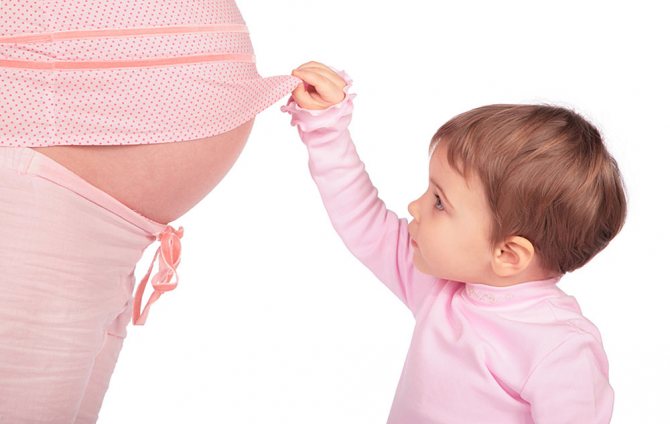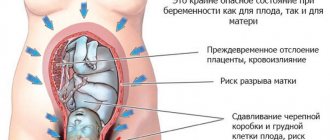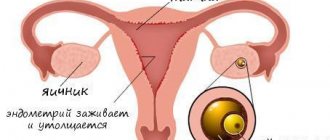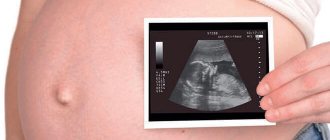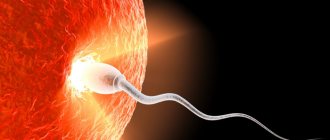Don't gain extra pounds
Perhaps the main problem of every expectant mother is not to gain more kilograms than she should. Doctors determined the limit - twelve kilograms. Moreover, it is worth remembering that the baby itself weighs about three and a half, another three kilograms are amniotic fluid, breasts and a small amount of fat cells. Everything else is those kilograms that you will eventually have to get rid of. This does not mean that you need to urgently go on a diet, but expectant mothers need to monitor their diet more carefully.
Instead of sweets, eat fruits, at night, if you are hungry, eat vegetables, replace wheat bread with cereal, add porridge to your diet, especially since your unborn baby needs fiber. Try to steam something, and replace fried with stewed. And without any special restrictions or efforts, you will gain exactly as much as you should. What are the dangers of extra pounds for pregnant women? Firstly, a ban on natural childbirth. You can either fatten the baby, or you simply cannot cope. Secondly, you may be at risk of premature birth due to the stress on your body. Well, and thirdly, doctors will strive to put you in the hospital for safekeeping.
Difficult pregnancy
Natalya Vladimirovna Romanova , Candidate of Medical Sciences, gynecologist-reproductologist of the capital's Center for Reproduction and Genetics "Nova Clinic" .
— Why is multiple pregnancy dangerous? After all, some women simply dream of twins. How they reason: it’s so good, once you tense up, and there are two kids at once...
— Of course, such desires are partly understandable. Pregnancy and childbirth are a colossal burden in every sense. And it is not surprising that women would like to realize their maternal potential at one time, as they say, to get by with “little blood.” But in reality, it may turn out just the opposite. Multiple pregnancy is accompanied by a large number of complications from both the mother and the fetus. According to statistics, the most common problems faced by women pregnant with twins or triplets are miscarriage, gestational diabetes and hypertension. This also includes premature birth, which ends in more than half of pregnancies with twins, and 90% with triplets. Moreover, the vast majority of births occur by cesarean section. Hence all the potential risks for future babies. Today it is reliably known that in multiple pregnancies, children with low birth weight are more often born, who are admitted to the intensive care unit after birth. They have a several times higher risk of cerebral palsy, chronic lung diseases and vision problems. In the future, parents with twins and triplets are at greater risk of encountering behavioral disorders and difficulties in their children's learning. Today, the position of doctors is clear: multiple pregnancies are a serious problem. We need to use all the opportunities we have to reduce the risk of its occurrence. This can be done through the use of assisted reproductive technologies.
- But a multiple pregnancy can also be independent. And some parents in IVF programs consciously take this step. How to protect yourself and your children as much as possible?
— Of course, twins and triplets happen without IVF. Interestingly, their number has recently increased even among women who became pregnant on their own. But in percentage terms, cases of spontaneous conception do not stand up to any competition with reproductive technologies. In both situations, we must remember that multiple pregnancy requires closer attention both from the doctor and from the woman herself and her environment. Of course, a lot depends on the “initial balance of power”: the health and age of the expectant mother. There are amazing examples of women with twins calmly carrying a pregnancy to term and then independently giving birth to healthy babies. But let’s not lie, such cases are the exception rather than the rule. Therefore, all pregnant women with twins, and especially triplets, must remember the possible risks. And unquestioningly follow all the recommendations of your doctor.
— Multiple pregnancies after IVF are quite understandable, because several embryos are “planted” to be on the safe side. What can you do here?
— There are two ways to solve the problem of multiple pregnancies during IVF. The first is embryo reduction. Its essence is to artificially reduce the number of living embryos in the early stages of pregnancy. This happens by injecting the drug into the pericardial area through the uterus under ultrasound guidance. This method is quite controversial. Since it is often accompanied by various complications. For example, insertion into the uterus can cause spasms and provoke spontaneous miscarriage. The moral side of the issue should not be ignored. Therefore, another method of preventing multiple pregnancies is now gaining more and more recognition - the transfer of one, or in special cases, two embryos. And no more. Today, this is an officially recognized postulate, which is followed by both foreign and Russian fertility doctors.
- Wait, but in this way the effectiveness of the IVF procedure itself decreases and the number of unsuccessful attempts increases?
— Of course, there is a certain risk.
But to avoid it, you need to select the most promising embryo before replanting. Foreign studies have shown that when strict selection criteria are applied, the probability of pregnancy is 30–40% per stimulation cycle. These figures are quite consistent with those observed during the transfer of several embryos. At the same time, the likelihood of a multiple pregnancy in cycles with the transfer of one embryo is virtually absent. In fact, most of the achievements of modern embryology precisely solve this super task - how to choose the best embryo. First of all, it is necessary to evaluate all obtained embryos based on morphological characteristics. Each day of development has its own regulatory parameters, for example, the rate of cell division. It is necessary to select embryos that best fit these indicators. In addition to visual selection, there are also laboratory tests. In particular, in recent years, pre-implantation diagnostics have been used to determine embryos that are “promising” for implantation. It is carried out to identify hereditary genetic diseases and chromosomal disorders. For normal development of the human body, 46 chromosomes are needed. Any deviation in quantity can cause implantation failure, early pregnancy loss, or the birth of a child with chromosomal abnormalities. Therefore, it is so important to determine which embryo has the best chance before transfer. Such a study was previously carried out on the third day of embryo development. And only 5–7 of the most common chromosomal disorders could be identified. Today it is possible to analyze the entire set of chromosomes, but for this it is necessary to examine embryos on the 5th day of their development. This is a more complete diagnostic method that gives almost 100% results. However, processing the obtained data takes time, so the embryos are cryopreserved after collecting material for research. And their transfer is carried out in the next menstrual cycle, when the analysis results are ready. Of course, not all married couples are ready for this. However, there are situations when such research is necessary. This is the age of a woman over 37 years old, especially if her husband is not young. Also at risk are those who have experienced miscarriages, undeveloped pregnancies caused by genetic reasons, and multiple unsuccessful attempts at IVF. It is advisable to undergo such a study in case of serious disorders of spermatogenesis in a spouse, as well as in cases of disturbances in the karyotype in one or both parents or in an existing child with a genetic disease. We have no right to force anyone. Every woman makes her own choice, because this is her life. Our task is to do everything possible to protect the expectant mother and her baby. Anna FROLOVA
Leg cramps
Already in the second trimester of pregnancy, expectant mothers may encounter the problem of cramps in the legs, namely in the calf muscles. The pain is simply indescribable! Moreover, usually my legs cramp at night, and I have to wake up, whether by will or not. This is a very alarming sign, as it occurs due to a lack of calcium in the mother’s body. This means that your baby also lacks this element, since he has to draw these resources from you. You urgently need to introduce cottage cheese and milk into your diet. Many doctors advise drinking calcium, as well as Magnesium B6. If this trouble does happen to you at night, get up, walk around, massage your legs in the calf area, apply a warm compress, and in a few minutes the pain will go away.
Sleep disturbance
At the very beginning of pregnancy, women experience excessive sleepiness, but after just a few weeks, it is replaced by long-term insomnia. It is associated with significant changes in the body of the expectant mother. Some suffer from nausea, some suffer from leg cramps, others simply become overly nervous. And the longer the period, the more reasons for concern there are, and therefore for insomnia. The best way to get a good night's sleep is to not overexert yourself, try to relax and calm down. Take a warm bath before going to bed, ventilate the room to make it a little cool and fresh. Buy a special pregnancy pillow to help you get more comfortable, or stock up on a few regular pillows. And before going to bed, do not overeat; if you are hungry, drink a mug of warm milk.
Heartburn and nausea
Unfortunately, I have not met a single pregnant woman who did not complain of nausea or heartburn. This disease manifests itself especially acutely at the very beginning, when the body is being rebuilt, and at the end, when the baby is already putting pressure on the internal organs, in particular on the stomach. How can you help yourself? Try to avoid fatty foods or foods with strong spicy flavors. For some, milk before meals helps, for others, hard cheese, jelly, or nuts. Nausea can be caused by low blood pressure, high hormone levels, or lack of blood sugar. Here, a green apple or cookies, still mineral water, green tea with mint can help you.
Ultrasound during pregnancy
One of the issues that adds headaches to expectant mothers is related to mandatory ultrasound. Many people ask - how many times can you undergo an ultrasound examination and is it harmful for the child? So, as it turned out, there is not a single scientific study in the world that proves that ultrasound has any effect on the development of the baby or the health of the expectant mother. If there is a reason for an ultrasound examination, it should be done as long as there is a need for it. The only downside may be that you will go to the clinic and have contact with possibly sick people.
Statistics of unplanned pregnancies
According to statistics, every fourth woman gets rid of an unwanted pregnancy.
- Often, if a couple is not in an official relationship, then the man, like a decent gentleman, proposes to the woman.
- In family relationships, if a woman has strongly decided to leave the baby, the man follows her lead, even if he himself is not happy with what is happening. It may well happen that the relationship will crack after such imposed paternity.
Swelling in the legs
At the beginning of pregnancy, it is enough for a woman to drink about two to three liters of fluid per day. In the second and third trimester, the amount of fluid must be carefully controlled, since excessive consumption can lead to edema or even dropsy. This is due to the fact that during this period a greater load is placed on the kidneys, and they begin to secrete much more fluid than before pregnancy. Therefore, the amount of water should be halved and try not to eat salty foods, since salt promotes water retention in the body.
Unplanned third pregnancy
It happens that a woman has already given birth to two children. Gradually, she begins to move away from household chores, takes her older child to school, and her younger child to kindergarten. And I already have free time for myself and my beloved. A young mother plans to go (or has already gone) to work, but again there is a delay and two lines on the test... Of course, if you did not dream of becoming a large mother of five children, then the news of an unplanned third pregnancy will be disappointing. Especially when the family income is not very large. What to do in this situation, the woman must decide for herself. Most likely, such news will come as a shock for the husband too. Alas, statistics say that in most cases the outcome of such a pregnancy is abortion. But look at the situation differently:
- In a family with many children, the elders look after the younger ones.
- You will receive the status of a mother of many children, and these are additional benefits.
- The third child will be provided in advance with all the necessary baby supplies that were left over from the previous children.
- You will not lose your husband's respect by refusing an abortion.

Decreased immunity, colds
Due to decreased immunity during pregnancy, you have to pay closer attention to your health. Many expectant mothers are susceptible to colds, and medications during this period can only be taken with the consent of a doctor. Even a common cold with a runny nose can cause sinusitis in pregnant women. Rinse your nose with salt water, or buy special nasal drops based on sea water at the pharmacy.
If you have a sore throat, inhalations come to the rescue, which can be done both in the clinic and at home, with potatoes or herbs. Hot tea with chamomile and eucalyptus will also have a strengthening effect on the body.
Animals in the house
Nowadays, expectant mothers are arguing everywhere about whether it is possible to keep pets during pregnancy. Let's give an explanation using cats. They, in turn, are carriers of an infection called toxoplasmosis, which can harm the child. Many people don’t even know what it is, although according to statistics, about sixty percent of the population have had it.
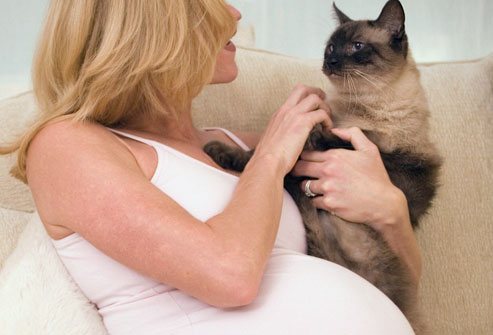
However, if an animal has been living in a family for a long time, then we can say with one hundred percent certainty that all family members already have antibodies in their blood, and therefore the expectant mother cannot infect the child. And when the baby is born, the mother will give him protection against this infection through breast milk. That is why there is no point in parting with your pets if they have been living with you for a considerable time. It is not worth getting a pet during pregnancy.
Unplanned second pregnancy
There are situations when a woman, having learned about a second unwanted pregnancy, still decides to keep it. The reason for this may be:
- Fear of losing the opportunity to become a mother again.
- Possible complications after an abortion.
- Doctors prohibit abortions based on certain characteristics of women's health.
- Persuading the other half and other family members to leave the baby.
Be that as it may, the result is the same - the woman will have to bear and give birth to a child. And if she decides to do this, then everything is not so hopeless, the child can become loved.
In most cases, unwanted pregnancy occurs only because there are certain accompanying factors, and not because the woman is deprived of maternal instinct. Having considered them, it will be easier to accept the situation:
- The woman wants a second child, but not now, it happened to her at the wrong time. Studies have not been completed, a career has not been completed, an apartment has not been purchased, the first child is still too small, etc. Thanks to the support of relatives, this denial and blues go away on their own, and the expectant mother begins to love the child within herself.
- A woman is left alone with her pregnancy, without financial support, especially since she already has one child. Many husbands leave their wives, or there was an affair on the side - it doesn’t matter, the result is already inside it. It’s important here how the woman reacts to her situation; you can even turn to a psychologist. You need to find all the positive aspects of motherhood (and they are already known with the first baby), which will only double. It won’t always be difficult, the dark streak will come someday too.
- There is a certain type of women who do not want to limit their freedom by starting a family and children. They can be happy without it. They are dependent on the opinions of others, and pregnancy occurs because “it’s necessary” or “it’s time.” The pregnancy seems to be planned, but not desired, but because the parents are expecting a grandson, the husband is expecting an heir, etc. You need to try to learn from your relatives all the positive expectations for the future and make an appointment with a specialist.
- The child was needed to achieve certain goals: to keep a man, to have separate housing, to be separated from parental care, etc. The woman wanted pregnancy, and when her motive did not achieve a positive result, the pregnancy was no longer necessary. And then the baby, as a means of realization, ceases to be necessary. Then the expectant mother needs to find new motives to achieve one goal - the happiness of motherhood.
